- Home
- Jack Kerouac
Tristessa Page 2
Tristessa Read online
Page 2
I TAKE OUT my whiskey bottle from the bag, the Canady Dry, open both, and pour me a hiball in a cup—making one too for Cruz who has just jumped outa bed to throw up on the kitchen floor and now wants another drink, she’s been in the cantina for women all day somewhere back near the whore district of Panama Street and sinister Rayon Street with its dead dog in the gutter and beggars on the sidewalk with no hats looking at you helplessly—Cruz is a little Indian woman with no chin and bright eyes and wears high heel pumps without stockings and battered dresses, what a wild crew of people, in America a cop would have to do a double take seeing them pass all be-wrongled and arguing and staggering on the sidewalk, like apparitions of poverty—Cruz takes a hiball and throws it up too. Nobody notices, El Indio is holding eyedropper in one hand and little piece of paper in the other arguing, tense necked, red, fullblast at a screaming Tristessa whose bright eyes dance to fight it out—The old lady Cruz groans from the riot of it and buries back in her bed, the only bed, under her blanket, her face bandaged and greasy, the little black dog curling against her, and the cat, and she is lamenting something, her drink sickness, and El Indio’s constant harassing for more of Tristessa’s supply of morphine—I gulp my drink.
Next door the mother’s made the little daughter cry, we can hear her praying little woeful squeals enough to make a father’s heart break and maybe it might be,—Trucks pass, buses, loud, growling, loaded to the springs with people riding to Tacuyaba and Rastro and Circumvalacion round-routeries of town—the streets of mess puddles that I am going to walk home in at 2 A M splashing without care through streetpools, looking along lone fences at the dismal glimmer of the wet rain shinning in the streetlight—The pit and horror of my grit, the Virya tense-neck muscles that a man needs to steel his teeth together to press through lonely roads of rain at night with no hope of a warm bed—My head fells and wearies to think of it. Tristessa says “How is Jack,—?—” She always asks: “Why are you so sad??—’Muy dolorosa”‘ and as though to mean “You are very full of pain,” for pain means dolor—“I am sad because all la vida es dolorosa,” I keep replying, hoping to teach her Number One of the Four Great Truths,—Besides, what could be truer? With her heavy purple eyes she lids at me the nodding reprisal, ‘ha-hum,’ Indian-wise understanding the tone of what I said, and nodding over it, making me suspicious of the bridge of her nose where it looks evil and conniving and I think of her as a Houri Hari Salesman in the hellbottoms Kshitigarbha never dreamed to redeem.—When she looks like an evil Indian Joe of Huckleberry Finn, plotting my demise—El Indio, standing, watching through sad blackened-blue eye flesh, hard and sharp and clear the side of his face, darkly hearing that I say All Life is Sad, nods, agreeing, no comment to make to me or to anyone about it.
Tristessa is bending over the spoon boiling morphine in it with a match boilerfactory. She looks awkward and lean and you see the lean hocks of her rear, in the kimono-like crazydress, as she kneels prayer fashion over the bed boiling her bang over the chair which is cluttered with ashes, hairpins, cottons, Konk material like strange Mexican eyelash lippmakers and teasies and greases—one jiblet of a whole bone of junk, that, had it been knocked down would have added to the mess on the floor only a minor further amount of confusion.—“I raced to find that Tarzan,” I’m thinking, remembering boyhood and home as they lament in the Mexican Saturday Night Bedroom, “but the bushes and the rocks weren’t real and the beauty of things must be that they end.”
I WAIL ON my cup of hiball so much they see I’m going to get drunk so they all permit me and beseech me to take a shot of morphine which I accept without fear because I am drunk—Worse sensation in the world, to take morphine when you’re drunk, the result knots in your forehead like a rock and makes great pain there warring in that one field for dominion and none to be had because they’ve cancelled out each other the alcohol and the alkaloid. But I accept, and as soon as I begin to feel its warning effect and warm effect I look down and perceive that the chicken, the hen, wants to make friends with me—She’s walking up close with bobbing neck, looking at my knee cap, looking at my hanging hands, wants to come close but has no authority—So I stick my hand out to its beak to be pecked, to let her know I’m not afraid because I trust her not to hurt me really—which she doesn’t—just stares at my hand reasonably and doubtfully and suddenly almost tenderly and I pull away my hand with a sense of the victory. She contentedly chuckles, plucks up a piece of something from the floor, throws it away, a piece of linen thread hangs in her beak, she tosses it away, looks around, walks around the golden kitchen of Time in huge Nirvana glare of Saturday night and all the rivers roaring in the rain, the crash inside my soul when I think of babyhood and you watch the big adults in the room, the wave and gnash of their shadowy hands, as they harangue about time and responsibility, in a Golden Movie inside my own mind without substance not even gelatinous—the hope and horror of the void—great phantoms screeching inside mind with the yawk photograph VLORK of the Rooster as he now ups and emits from his throat intended for open fences of Missouri explodes gunpowder blurts of morningshame, reverend for man—At dawn in impenetrable bleak Oceanities of Undersunk gloom, he blows his rosy morn Collario and still the farmer knows it wont tend that rosy way. Then he chuckles, rooster chuckles, comments on something crazy we might have said, and chuckles—poor sentient noticing being, the beast he knows his time is up in the Chickenshacks of Lenox Avenue—chuckles like we do—yells louder if a man, with special rooster jowls and jinglets—Hen, his wife, she wears her adjustible hat falling from one side of her pretty beak to the other. “Good morn ing Mrs. Gazookas,” I tell her, having fun by myself watching the chickens as I’d done as a boy in New Hampshire in farmhouses at night waiting for the talk to be done and the wood to be taken in. Worked hard for my father in the Pure Land, was strong and true, went to the city to see Tathagata, leveled the ground for his feet, saw bumps everywhere and leveled the ground, he passed by and saw me and said “First level your own mind, and then the earth will be level, even unto Mount Sumeru” (the ancient name for Everest in Old Magadha) (India).
I WANTA MAKE friends with the rooster too, by now I’m sitting in front of the bed in the other chair as El Indio has just gone out with a bunch of suspicious men with mustaches one of whom stared at me curiously and with pleased proud grin as I stood with cup in hand acting drunk before the ladies for his and his friends’ edification—Alone in the house with the two women I sit politely before them and we talk earnestly and eagerly about God. “My friends ees seek, I geev them shot,” beautiful Tristessa of Dolours is telling me with her long damp expressive fingers dancing little India-Tinkle dances before my haunted eyes. “—Eees when, cuando, my friend does not pays me back, don I dont care. Because” pointing up with a straight expression into my eyes, finger aloft, “my Lord pay me—and he pay me more—M-o-r-e”—she leans quickly emphasizing more, and I wish I could tell her in Spanish the illimitable and inestimable blessing she will get anyway in Nirvana. But I love her, I fall in love with her. She strokes my arm with thin finger. I love it. I’m trying to remember my place and my position in eternity. I have sworn off lust with women,—sworn off lust for lust’s sake,—sworn off sexuality and the inhibiting impulse—I want to enter the Holy Stream and be safe on my way to the other shore, but would as lief leave a kiss to Tristessa for her hark of my heart’s sake. She knows I admire and love her with all my heart and that I’m holding myself back. “You have you life,” she says to Old Bull (of whom in a minute) “and I haff mind, mine, and Jack has hees life” indicating me, she is giving me my life back and not claiming it for herself as so many of the women you love do claim.—I love her but I want to leave. She says: “I know it, a man and women iss dead,—” “when they want to be dead”—She nods, confirms within herself some dark Aztecan instinctual belief, wise—a wise woman, who would have graced the herds of Bhikshunis in very Yasodhara’s time and made a divine additional nun. With her lidded eyes and clasped hand
s, a Madonna. It makes me cry to realize Tristessa has never had a child and probably never will because of her morphine sickness (a sickness that goes on as long as the need and feeds off the need and fills in the need simultaneously, so that she moans from pain all day and the pain is real, like abcesses in the shoulder and neuralgia down the side of the head and in 1952 just before Christmas she was supposed to be dying), holy Tristessa will not be cause of further rebirth and will go straight to her God and He will recompense her multibillionfold in aeons and aeons of dead Karma time. She understands Karma, she says: “What I do, I reap” she says in Spanish—“Men and women have errores—errors, faults, sins, faltas,” humanbeings sow their own ground of trouble and stumble over the rocks of their own false erroring imagination, and life is hard. She knows, I know, you know.—“Bot—I weeling to haff jonk—morfina—and be no-seek any more.” And she hunches her elbows with peasant face, understanding herself in a way that I cannot and as I gaze at her the candlelight flickers on the high cheekbones of her face and she looks as beautiful as Ava Gardner and even better like a Black Ava Gardner, A Brown Ava with long face and long bones and long lowered lids—Only Tristessa hasnt got that expression of sex-smile, it has the expression of mawkfaced down-mouthed Indian disregard for what you think about its own pluperfect beauty. Not that it’s perfect beauty like Ava, it’s got faults, errors, but all men and women have them and so all women forgive men and men forgive women and go their own holy ways to death. Tristessa loves death, she goes to the ikon and adjusts flowers and prays,—She bends over a sandwich and prays, looking sideways at the ikon, sitting Burmese fashion in the bed (knee in front of knee) (down) (sitting), she makes a long prayer to Mary to ask blessing or thanks for the food, I wait in respectful silence, take a quick peek at El Indio, who is also devout and even on the point of crying from junk his eyes moist and reverent and sometimes like especially when Tristessa removes her stockings to get in the bed-blankets an undercurrent of reverent love sayings under his breath (“Tristessa, O Yé, comme t’est Belle”) (which is certainly what I’m thinking but afraid to look and watch Tristessa remove her nylons for fear I will get a flash sight of her creamy coffee thighs and go mad)—But El Indio is too loaded with the poison solution of morphine to really care and follow up his reverence for Tristessa, he is busy, sometimes busy being sick, has a wife, two children (down the other side of town), has to work, has to cajole stuff off Tristessa when he himself is out (as now)—(reason for his presence in the house)—I see the whole thing popping and parenthesizing in every direction, the story of that house and that kitchen.
In the kitchen is hanging pictures of Mexican Pornography Girls, with black lace and big thighs and revealing clouds of bosom and pelvic drapery, that I study intently, in the right places, but the pictures (2) are all roiled and rain-stained and roll-spanned and hanging protruding from the wall so you have to straighten them down to study, and even then the rain is misting down through the cabbage leaves above and the soggy cardboard—Who might have tried to make a roof for Fellaheena?—“My Lord, he pay me back more”—
SO NOW EL INDIO is back and standing at the head of the bed as I sit there, and I turn to look at the rooster (“to tame him”)—I put my hand out exactly as I had done for the hen and allow it to see I’m not scared if it pecks me, and I will pat it and make it free from fear of me—The Rooster gazes at my hand without comment, and looks away, and looks back, and gazes at my hand (the seminal gysmal champion who dreams a daily egg for Tristessa that she sucks out the end after a little puncture, fresh)—he looks at my hand tenderly but majestically moreover as the hen can’t make that same majestical appraisal, he’s crowned and cocky and can howl, he is the King Fencer biting the duel with that mosey morn. He chuckles at sight of my hand, meaning Yeh and turns away—and I look proudly around to see if Tristessa and El Indio heard my wild estupiante—They rave to notice me with avid lips, “Yes we been talkin about the ten gram-mos we gonna get tomorrar—Yeh—” and I feel proud to’ve made the Rooster, now all the little animals in the room know me and love me and I love them though may not know them. All except The Crooner on the roof, on the clothes closet, in the corner away from the edge, against the wall just under the ceiling, cozy cooing Dove is sitting in nest, ever contemplating the entire scene forever without comment. I look up, my Lord is flapping his wings and coo doving white and I look at Tristessa to know why she got a dove and Tristessa lifts up her tender hands helplessly and looks at me affectionately and sadly, to indicate, “It is my Pigeon”—“my pretty white Pigeon—what can I do about it?” “I love it so”—“It is so sweet and white”—“It never make a noise”—“It got soch prurty eyes you look you see the prurty eyes” and I look into the eyes of the dove and they are dove’s eyes, lidded, perfect, dark, pools, mysterious, almost Oriental, unbearable to withstand the surge of such purity out of eyes—Yet so much like Tristessa’s eyes that I wish I could comment and tell Tristessa ‘Thou hast the dove’s eyes’—
Or every now and then the Dove rises and flaps her wings for exercise, instead of flying through the bleak air she waits in her golden corner of the world waiting for perfect purity of death, the Dove in the grave is a dark thing to rave—the raven in the grave is no white light illuminating the Worlds pointing up and pointing down throughout uppity ten sides of Eternity—Poor Dove, poor eyes,—her breast white snow, her milk, her rain of pity over me, her even gentle eye-gaze into mine from rosy heights on a position in a rack and Arcabus in the Ope Heavens of the Mind World,—rosy golden angel of my days, and I can’t touch her, wouldn’t dare get up on a chair and trap her in her corner and make her leery human teeth-grins trying to impress it to my bloodstained heart—her blood.
EL INDIO HAS brought sandwiches back and the little cat is going crazy for some meat and El Indio gets mad and slaps it off the bed and I throw both hands up at him “Non” “Don’t do that” and he doesn’t even hear me as Tristessa yells at him—the great Man Beast raging in the kitchen meat and slapping his daughter in her chair clear across the room to tumble on the floor her tears start starting as she realizes what he’s done—I don’t like El Indio for hitting the cat. But he isn’t vicious about it, just merely reprimandatory, stern, justified, dealing with the cat, kicking the cat out of his way in the parlor as he walks to his cigars and Television—Old Father Time is El Indio, with the kids, the wife, the evenings at the supper table slapping the kids away and yornching on great meaty dinners in the dim light—“Blurp, blap,” he lets go before the kids who look at him with shining and admiring eyes. Now it’s Saturday night and he’s dealing with Tristessa and wrangling to explain her, suddenly the old Cruz (who is not old, just 40) jumps up crying “Yeh, with our money, Si, con nuestra dinero” and repeating twice and sobbing and El Indio warns her I might understand (as I look up with imperial magnificence of unconcern tinged by regard for the scene) and as if to say “This woman is crying because you take all their money,—what is this? Russia? Mussia? Matamorapussia? as if I didn’t care anyway which I couldnt. All I wanted to do was get away. I had completely forgotten about the dove and only remembered it days later.
THE WILD WAY Tristessa stands legs spread in the middle of the room to explain something, like a junkey on a corner in Harlem or anyplace, Cairo, Bang Bombayo and the whole Fellah Ollah Lot from Tip of Bermudy to wings of albatross ledge befeathering the Arctic Coastline, only the poison they serve out of Eskimo Gloogloo seals and eagles of Greenland, ain’t as bad as that German Civilization morphine she (an Indian) is forced to subdue and die to, in her native earth.
MEANWHILE THE CAT is comfortably ensconced at Cruz’s face place where she lies at the foot of the bed, curled, the way she sleeps all night while Tristessa curls at the head and they hook feet like sisters or like mother and daughter and make one little bed do comfortably for two—The little pink kitkat is so certain (despite all his fleas crossing the bridge of his nose or wandering over his eyelids)—that everything is al
right—that all is well in the world (at least now)—he wants to be near Cruz’s face, where all is well—He (it’s a little She) he doesnt notice the bandages and the sorrow and the drunksick horrors she’s having, he just knows she’s the lady all day her legs are in the kitchen and every now and then she dumps him food, and besides she plays with him on the bed and pretends she’s gonna beat him up and holds and scolds him and he yurks in little face into little head and blinks his eyes and flaps back his ears to wait for the beating but she’s only playing with him—So now he sits in front of Cruz and even though we may gesture like maniacs as we talk and occasionally a rough hand is waved right by its whiskers almost hitting it or El Indio might roughly decide to throw a newspaper on the bed and land it right on his head, still he sits digging all of us with eyes closed and curled up under Cat Buddha style, meditating among our mad endeavors like the Dove above—I wonder: “Does kittykat know there’s a pigeon on the clothes closet.” I wish my relatives from Lowell were here to see how people and animals live in Mexico—
But the poor little cat is one mass of fleas, but he doesnt mind, he doesnt keep scratching like American cats but just endures—I pick him up and he’s just a skinny little skeleton with great balloons of fur—Everything is so poor in Mexico, people are poor, and yet everything they do is happy and carefree, no matter what is—Tristessa is a junkey and she goes about it skinny and carefree, where an American would be gloomy—But she coughs and complains all day, and by same law, at intervals, the cat explodes into furious scratching that doesnt help—

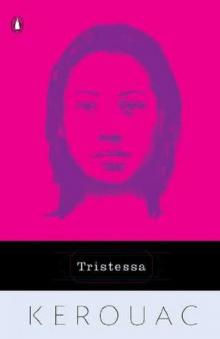 Tristessa
Tristessa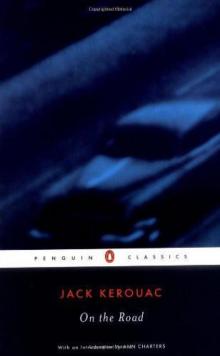 On the Road
On the Road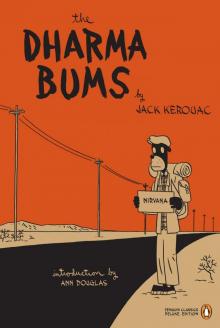 The Dharma Bums
The Dharma Bums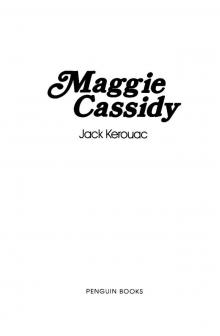 Maggie Cassidy
Maggie Cassidy Big Sur
Big Sur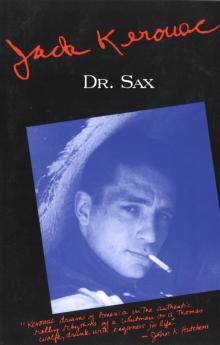 Dr. Sax
Dr. Sax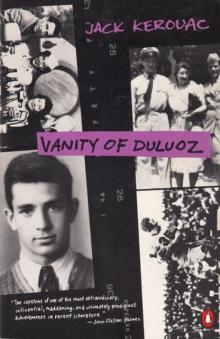 Vanity of Duluoz: An Adventurous Education, 1935-46
Vanity of Duluoz: An Adventurous Education, 1935-46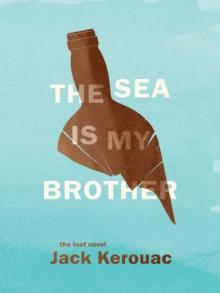 The Sea Is My Brother
The Sea Is My Brother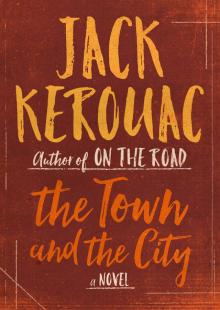 The Town and the City: A Novel
The Town and the City: A Novel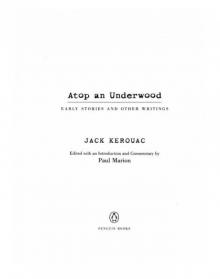 Atop an Underwood: Early Stories and Other Writings
Atop an Underwood: Early Stories and Other Writings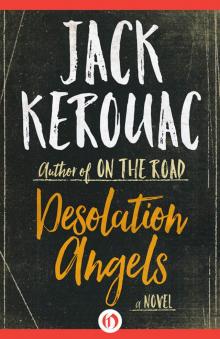 Desolation Angels: A Novel
Desolation Angels: A Novel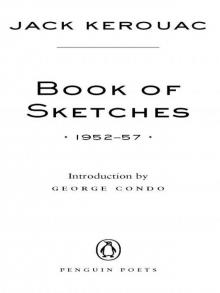 Book of Sketches
Book of Sketches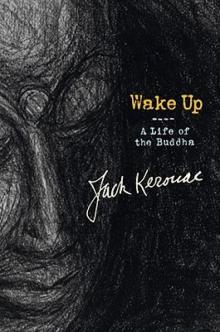 Wake Up: A Life of the Buddha
Wake Up: A Life of the Buddha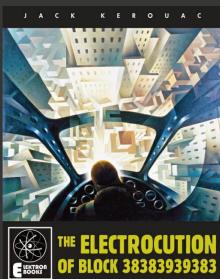 The Electrocution of Block 38383939383
The Electrocution of Block 38383939383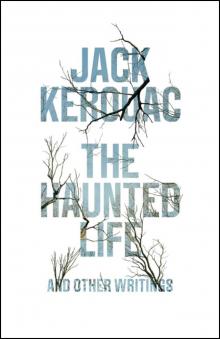 Haunted Life
Haunted Life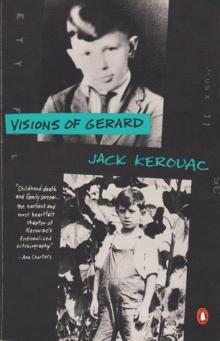 Visions of Gerard
Visions of Gerard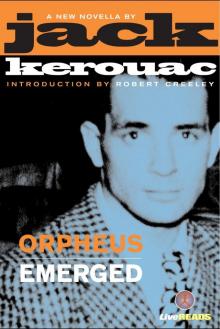 Orpheus Emerged
Orpheus Emerged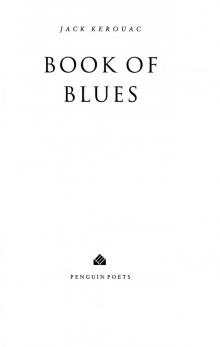 Book of Blues
Book of Blues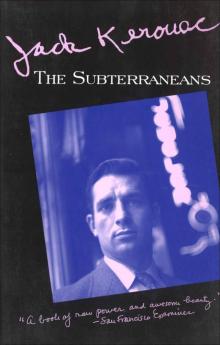 The Subterraneans
The Subterraneans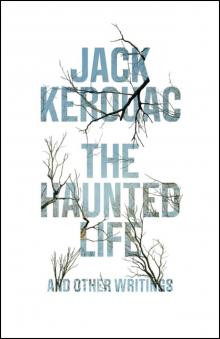 The Haunted Life
The Haunted Life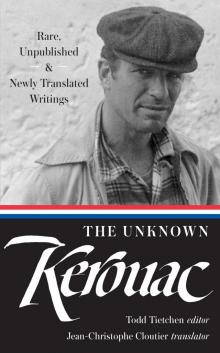 The Unknown Kerouac
The Unknown Kerouac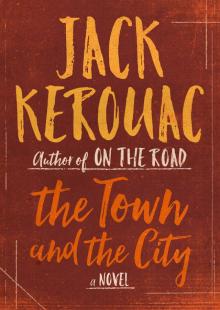 The Town and the City
The Town and the City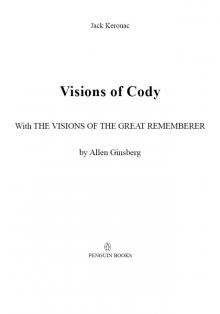 Visions of Cody
Visions of Cody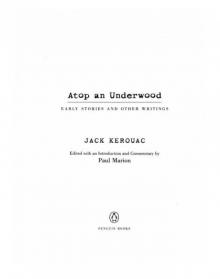 Atop an Underwood
Atop an Underwood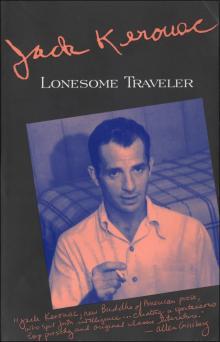 Lonesome Traveler
Lonesome Traveler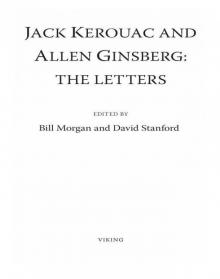 Jack Kerouac and Allen Ginsberg
Jack Kerouac and Allen Ginsberg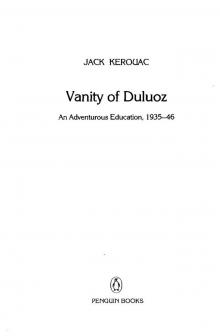 Vanity of Duluoz
Vanity of Duluoz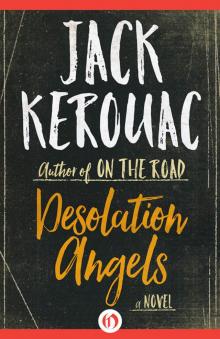 Desolation Angels
Desolation Angels On the Road: The Original Scroll: (Penguin Classics Deluxe Edition)
On the Road: The Original Scroll: (Penguin Classics Deluxe Edition)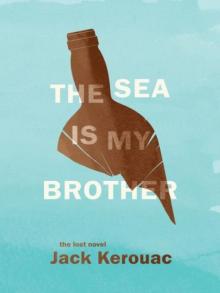 The Sea Is My Brother: The Lost Novel
The Sea Is My Brother: The Lost Novel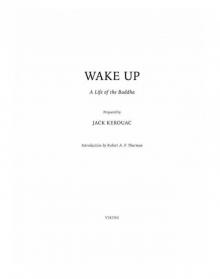 Wake Up
Wake Up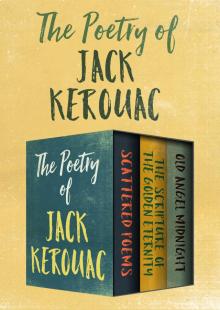 The Poetry of Jack Kerouac
The Poetry of Jack Kerouac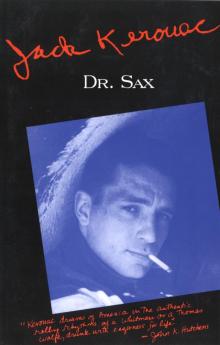 Doctor Sax
Doctor Sax